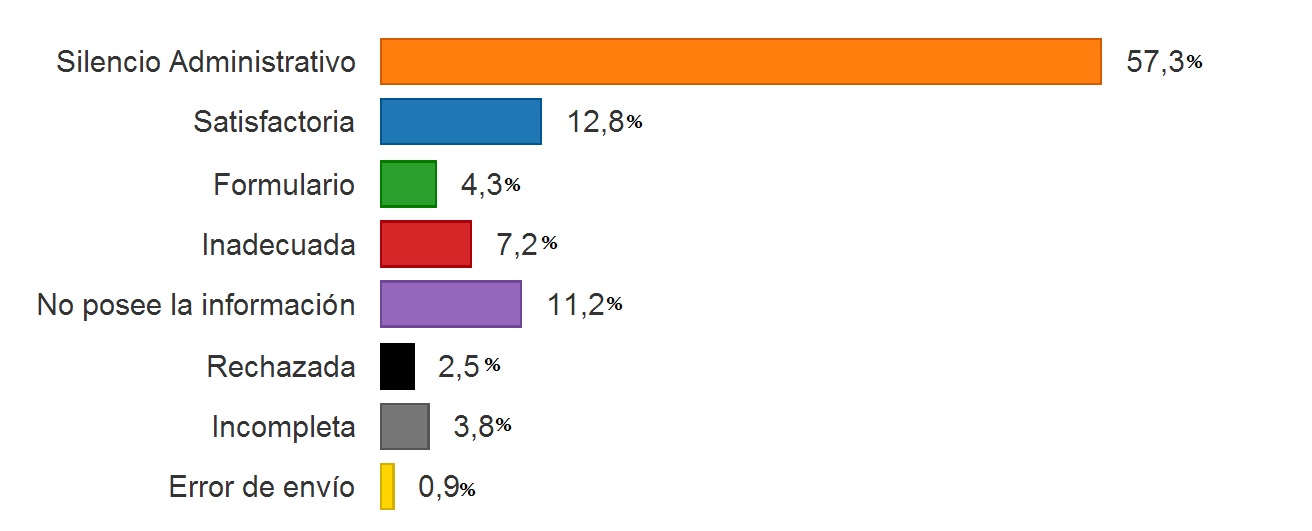» Administrative silence increased with respect to 2012 despite the fact institutions should be working already to meet the requirements of the new law
» Only 13% of requests received the information asked for
» Whilst Spanish Autonomous Communities were better at responding, municipalities and other local levels ignored 81% of requests made – an increase of more than 11% compared to the previous year
» Access Info Europe and Fundación Ciudadana Civio present the Tuderechoasaber.es Report 2013, analysing access to information requests sent to Spanish institutions

Madrid, 9 April 2014 – In 2013, the year the Spanish Transparency Law was approved by parliament, Spanish institutions resorted to administrative silence on more occasions than in the previous year. With less than eight months until the entry into force of the new law at the national level, 57% of access to information requests made through Tuderechoasaber.es, a Spanish online request platform, did not receive any reply (3% more than the previous year). The Tuderechoasaber.es Report 2013 (in Spanish ![]() ) was published today by Access Info Europe and Fundación Ciudadana Civio, the two organisations that run the platform.
) was published today by Access Info Europe and Fundación Ciudadana Civio, the two organisations that run the platform.
The report is based on the analysis of the 654 access to information requests sent between 1 January 2013 and 31 December 2013. Of these requests, 375 did not receive any answer, and only 13% (84 requests) received the information requested. In 11% of cases, the institutions claimed they did not have the information requested; 7% were inadequate (cases in which the answer had nothing to do with the question); 4% were incomplete; 4% referred requesters to online forms (restricting the use of email), and 2% were rejected.
“The bad results of 2012 are not only maintained, they have gotten worse a year later. Whilst the opacity of public institutions in Spain is growing, the Government rules out introducing improvements to the transparency law that we consider to be insufficient – and just as with the development of the Transparency Law, we know very little about how it will be implemented”, signalled Victoria Anderica, Campaign Coordinator at Access Info Europe.
More opaque municipalities, more transparent Autonomous Communities
The report reveals an alarming growth of opacity at the local level. Municipalities and other local-level institutions ignored 81% of the access to information requests made, 11% more than in 2012. These entities have one year extra to deal with this problem as they are not obliged to apply the new law until December 2015. Amongst constitutional bodies, State agencies, regulatory bodies, public companies and political parties, 59% of the questions made were met with administrative silence.
On the other hand, regional level institutions (Autonomous Communities) were better at answering citizens’ requests than the previous year, given that many of the regions are are currently drafting their own transparency laws. This meant that Autonomous Community governments reduced from 41% to 32% the number of requests ignored. Amongst the regions, Catalonia has received the highest number of requests in 2013; of the 19 access to information requests, 47% were settled with administrative silence and 31% were directed to internal forms, meaning that the answer, if there was one, was kept out of public view. “It has not always been like this. Until recently, the Generalitat accepted questions via email, but now they ban this medium of communication and will not give us a contact email address”, explains Eva Belmonte, Fundación Ciudadana Civio.
Additionally, the report highlights the cases of the Madrid Autonomous Community (19 requests, 53% of the answers claimed not having the information), Galicia (nine requests and 44% met with administrative silence), Castilla y León (15 requests, eight of which were satisfactory) and the Basque Country (17 requests, eight of which were satisfactory).
“We don’t have this information”
Administrative silence was at its lowest at the State level, principally among Ministries (between 53% and 47%). Of the more than 550 public bodies listed on Tuderechoasaber.es, most requests in 2013 were sent to The Finance and Public Administration Ministry. Although administrative silence here occured less often than the average (17%), the Ministry claimed to not possess the information requested in 48% of cases. Of the 19 requests for information sent to the Interior Ministry, none received a response.
“Whilst we wait for the Transparency Law to come into force, the vast majority of public bodies do not seem to be in any way prepared to comply with it”, confirmed Eva Belmonte. “What has happened with requests for environmental information, which has had its own specific law since July 2006? Of the 38 requests related to the enviroment in 2013, almost 40% were ignored. That is why we repeat that it appears transparency is at the mercy of public institutions rather than by law”, she explains.
Last in line of countries with similar platforms
Tuderechoasaber.es is based on software called Alaveteli, which was first used in the UK in 2008, where 73% of requests were answered successfully. In comparison, Spanish institutions are failing and are at the end of the list of countries with similar platforms. Whilst only 13% of requests were answered satisfactorally in Spain, in the Czech Republic it was 63%, in Hungary 53%, New Zealand 51%, Germany 27% and Australia 21%. Only Tunisia with 11% of all requests answered successfully, was behind Spain.
For more information please contact:
Victoria Anderica, Access info Europe
victoria@access-info.org +34 606 592 976
Javier de Vega, Fundación Ciudadana Civio
javier@civio.es +34 650 074 421

